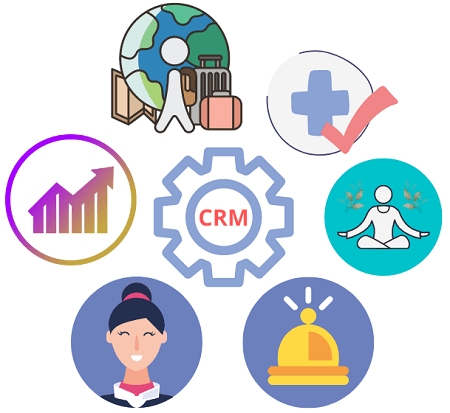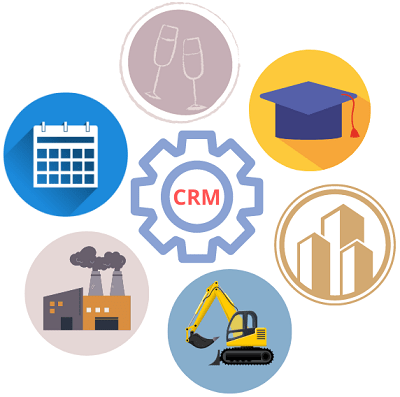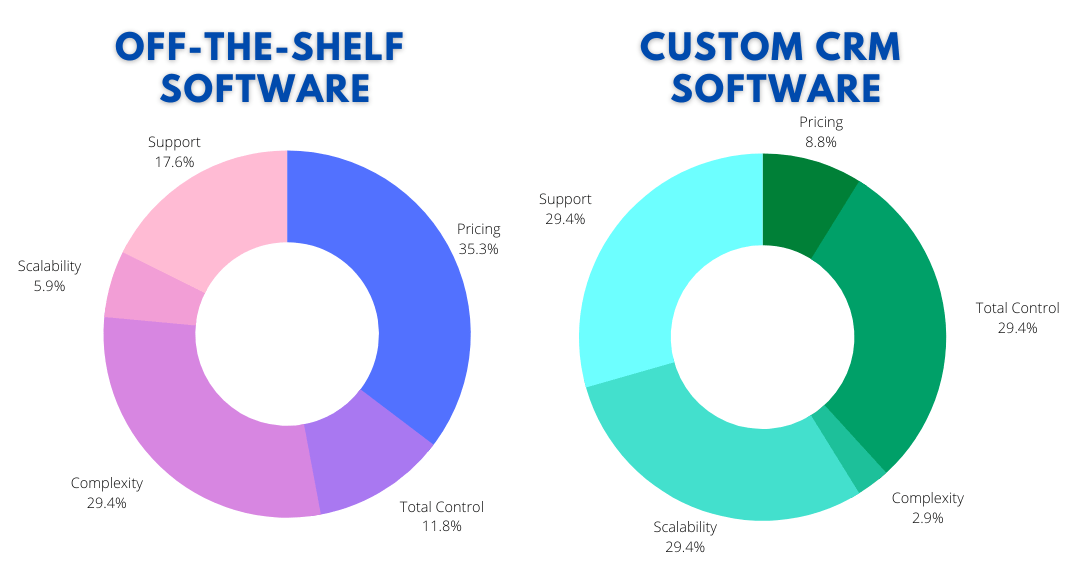WHAT ARE THE BENEFITS OF CUSTOM CRM DEVELOPMENT?
CRM system is employed to manage interactions between clients and businesses.
Information about the company’s partners, existing customers, and prospects is gathered, stored, assessed, and monitored.
Due to many integrated analytical capabilities and other integrations based on a company’s requirements, business owners may see their sales increase with the aid of custom CRM development.

Earlier, an Excel sheet was deployed to start organizing and collect client data for management.
The large appearance and difficulty of manually inputting a lot of data made this technique inconvenient.
These days, technology allows you to take advantage flexible programming languages and get a system that can handle activities such as sales forecasting, market research, tech support and many more by streamlining business operations in an organization.
Why is custom CRM development required, exactly?
With the upsurge in clients engaged in your company’s product or service, there is a critical requirement for custom CRM development.
The solutions assist in maintaining contact with businesses or customers who frequently purchase from your company and in providing personalized services to each client.
Thus, retaining existing clients over time, who otherwise would have move away to competitors.
Who really needs it?
Even though the service sector is the one that primarily seeks for CRMs, the manufacturing sector also need them.
Some of the most common businesses using Custom CRM systems fall under or are:

The Tourism and Hospitality Industry:
The Hotel and Resorts, Restaurants and Catering, Nightclubs and Bars.
The Financial Services Industry:
Credit Repair, Backtesting, Fund and Portfolio Management, Wealth Management, Mutual Funds, Trading, Insurance, Professional Advisory service providers and many more.
The Health and Wellness Industry:
Yoga Instructors, Dieticians, Nutritionists, Personal Care Assistants, Spa Service Providers, Weight Loss Coaches, Meditation Coaches, Beauticians, Gymnasiums, Sports Clubs etc.
The Housekeeping Industry:
Institutional Housekeeping and Domestic Housekeeping.
The Automotive Industry:
Auto Repair Shops, Car Wash Canters and Detail Shop Centers.

The Education Industry:
Schools, Colleges, Universities, Coaching Institutes and Coaching Classes.
The Events Industry:
Private Events, Corporate Events and Charity Events.
The Real Estate Industry:
Apartments Management Providers, Real Estate Agents and Property Management Agents.
The Manufacturing: OEM (Original Equipment Manufacturer) Industry:
Hardware manufacturers, Software manufacturers and spare parts manufacturers.
How may custom CRM development impact the business?

In your business, it facilitates the management of a continuous process.
The program allows the reestablishment of alliances or client ties in the event that one staff management leaves work on a certain project for a specific cause.
To do this, you just add the new employee’s block to the system’s record and assign them a follow-up on earlier business actions so they can go to function more promptly.
Is it adaptable to use in a company?
You have the freedom to incorporate the features you desire with a custom CRM system.
You may put up a set of features your business requires based on your business expert knowledge.
Additionally, it is flexible enough to completely improve your company’s operations.
Is the business process totally automated?
Depending on your company model, custom CRM systems may automate a wide range of tasks, including customer care, sales, marketing, support, analytics, and many more.
Automation of the process helps money-saving and customer retention.
Consequently, there is automatic and most efficient corporate growth.
Does it provide an analytical understanding of the business?

Undoubtedly, you must be extremely acquainted with your business to be at the top of your game in your field.
This includes pinpointing any bottlenecks, potential areas for progress, and strengths.
By providing a mix of tools and analytics to examine customer data, custom CRM solutions enable you to discover customer insights.
Is custom CRM future-scalable?
As your firm expands and market trends shift, business dynamics alter.
Therefore, using a custom CRM solution enables you to change the system as necessary to meet changing expectations.
As a result, you will have the ability to anticipate any transition and use that knowledge to your advantage.
Limitations of off-the-shelf software & Custom Software
Software that is available off-the-shelf, such as Microsoft Dynamics, Zoho CRM, and Salesforce, has significant limitations on scalability because there is very little room for customization.
Opting for open source software, such as vTiger or Odoo, allows you to entirely tailor it to meet your particular needs.
Furthermore, pre-built software frequently contains a ton of features that are unnecessary for your business. Open source doesn’t, though.

Off-the-shelf software has some of the most common limitations, including :
Pricing
The firm is burdened by the ongoing expenses related to off-the-shelf software.
Companies are required to pay monthly license costs for such software setup on a per-user accounts.
You pay for features that are useful, but you also pay for extras that you never use and are absolutely worthless to you.
Your entire business expenditures and, as a result, your profit margin, may be impacted by the price of implementing such software on a recurrent monthly basis over an extended period of time.
Total Control
Due to many of the functions being restricted and regulated, you do not have complete control over off-the-shelf software.
Since some software do not have a full control setup, you must contact their support team and wait for them to act on your behalf for even the smallest modification.
Delays of this nature are detrimental to corporate growth.
Complexity
Such apps are packed with several features and linked to numerous third-party tools, which greatly increase the dynamism and complexity of otherwise a simple system.
Therefore, it becomes challenging for business owners to comprehend the features and how to use the system in the best way possible.
Such delays cause a direct impact on business functions.
Scalability
Every company has a distinct set of functions.
Each business owner consequently requires a proper software to handle such a business.
The ability to scale off-the-shelf software to meet your company’s demands is absent.
As a result, you must use the software’s built-in functions to get by.
This slows down the growth of your company.
Support
Since the breadth of scalability, total control, compatibility, and custom development for off-the-shelf software is constrained, the support is likewise restricted to what we receive.
More beyond that shouldn’t be anticipated because it would be completely out of the question.

See How My Company Can Massively Automate Your Company Departments
Custom CRM Development – For Organizations to manage its Customer Interactions in addition to Sales, Marketing, Billing, Products, Services, Contacts, Customer Support, among other things.
Custom ERP Development – For Manufacturers to handle BOM, Quotation, Order, RFQ, PO, SOA, Manufacturing, Trading, Inventory, Quality Control, Logistics, Shipments, and so on.
Foundational Elements of Custom CRM Development
For a team of skilled developers, the CRM building process is rather straightforward.
There are no timeline chores that need to be planned out and completed since programmers create the patterns for the data and the rules that go with them to process them.

When constructing your own CRM system, make sure to incorporate such basic elements as:
- Dashboards (general and personal),
- A Calendar with reminder settings,
- Contacts,
- Leads
- Clients,
- Potential Customer,
- Inventory
- A helpdesk,
- Emails,
- File sharing,
- Payment processing,
- Custom workflows,
- Insights and reports, and
- Third-party app integration are just a few examples.
How to construct the CRM’s software architecture?
You move on to the three major stages of CRM development after establishing the primary goals and obstacles to create a project specification and identifying the user roles (workers who will handle a CRM platform).
Now let us run through all of these steps quickly.
1. Style
A conceptual model idea, a collection of various user interface components, and a workable production version are all created and accepted at this point.
2. Design and Quality Assurance

The development phase starts after the layout and model are made. A schedule for the project is approved, complete with goals.
Following that, designing and developing the agile methodologies and begin coding. Software testing comes next (e.g. Functional and load testing).
The solution is then offered to the target divisions after that.
3. Start and Supervision
Due to the fact that product integration involves numerous steps, this stage takes a while.
Employees must first be instructed on how to operate the new platform before the product is put on consumers’ devices and connected with the database.
After its successful launching, the system must be closely scrutinized in order to determine which features are useful to users and which ones need to be improved.
However, this information is used to modify and enhance the product.
What is the cost of a Custom CRM Software Development?
What does a custom CRM software cost?
Although there is no definitive answer to this issue, you should at least be aware of the some of the main elements that influence the cost of CRM systems.
And these components really examine your business requirements before arriving with a rough estimate of how much a CRM system would cost.
Computational Overview
The cost of developing any software product will always depend on this component.
Although simple bespoke CRM creation isn’t too difficult or expensive, sophisticated features like AI implementation would raise the whole cost by tens of thousands to several hundred thousand dollars.
Contact us along with requirement to find out exactly how much the features you want for your platform will cost.

Designing the Program
Refusing complex design options for your program helps you save some money.
Each new user might need to invest more time learning how to use it if there isn’t a well-designed, user-friendly interface.
Custom CRM Development
In the past, the price has varied depending on the business you engage, its region, and expertise.
By using outsourcing for development, small firms may benefit from cost savings on services.
By choosing to use services in currently well-liked Indian locations, businesses may construct unique CRM software at a cost that is almost three times lower.
Providing assistance and upkeep
All ongoing activities are stopped when a component of a system malfunctions or when its service agreements are reached.
Further, this clarifies the necessity of platform creation or selection by experts who can offer rapid technical help.
The price for assistance and maintenance might vary based on the issue and the situation.
A CRM Smartphone Application

Basically, a CRM comes in three different forms: a desktop application, a web application, and a mobile app.
The latter one is very useful since it enables businesses to better respond to client needs since a smartphone app is:
Time-saving –
Users only need to launch a browser or tap the phone screen to log in and begin using the web and mobile versions, which don’t require extensive system setup expertise from users.
Utilizable –
Employees don’t need to spend a lot of time learning how to utilize the web-version interface because it is simple.
Some applications allow users to modify it after logging in, giving each team member the chance to do so.
Conveniently Located –
The managers may visit a website or open an application to check the client’s information, orders, interaction history, etc. on the move thanks to CRM applications, which basically make all important data accessible from anywhere with Internet connection.
In conclusion
A long-lasting and successful relationship with customers may now be built via effective selling and communication techniques.
In addition to assisting your organization’s current procedures, custom CRM solutions also continuously contribute to the expansion of your company by tempting in new customers and keeping hold of existing ones.
Due to the restrictions it brings, off-the-shelf software cannot be helpful in a larger corporate scenario.
Custom software development is thus necessary right now.
Contact us if you wish to develop a superior CRM system for your organization.